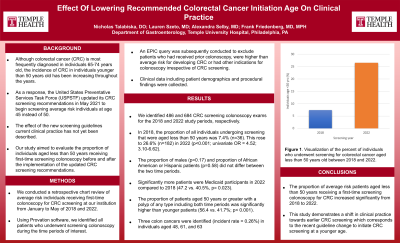Monday Poster Session
Category: Colorectal Cancer Prevention
P1758 - Effect of Lowering Recommended Colorectal Cancer Screening Initiation Age on Clinical Practice
Monday, October 23, 2023
10:30 AM - 4:15 PM PT
Location: Exhibit Hall


Nicholas J. Talabiska, DO
Temple University Hospital
Philadelphia, Pennsylvania
Presenting Author(s)
Nicholas J. Talabiska, DO1, Lauren Szeto, MD1, Alexandra Selby, MD1, Frank Friedenberg, MD, MS2
1Temple University Hospital, Philadelphia, PA; 2Temple University, Philadelphia, PA
Introduction: Although colorectal cancer (CRC) is more frequently diagnosed in older patients, the incidence of CRC in individuals younger than 50 years old has been increasing. In response, the United States Preventative Services Task Force (USPSTF) updated its CRC screening recommendations in May 2021 to begin screening average risk individuals at age 45. Previously, earlier screening in those less than 50 years old had only been recommended for African American individuals. The impact of the updated guidelines on clinical practice has not yet been described. Our study aimed to evaluate the proportion of individuals aged less than 50 years receiving first-time screening colonoscopy before and after the implementation of the updated CRC screening recommendations.
Methods: We conducted a retrospective chart review of average risk individuals receiving first-time colonoscopy for CRC screening at our urban institution from January to May of 2018 and 2022. Using ProvationMD® software, we identified all patients who underwent screening colonoscopy during the time periods of interest. An EPIC query was conducted to exclude patients who had received prior sentinel screening, were at high risk for developing CRC or had alternate indication for colonoscopy. SPSS v29 was used to perform univariate statistics.
Results: We identified 486 and 684 CRC screening colonoscopy exams for the 2018 and 2022 study periods, respectively. In 2018, the proportion of all individuals undergoing screening that were aged less than 50 years was 7.4% (n=36). This rose to 26.6% (n=182) in 2022 (p< 0.001; univariate OR = 4.52; 3.10-6.62, Figure 1). Significantly more patients were Medicaid participants in 2022 compared to 2018 (47.2 vs. 40.5%, p= 0.023). The proportion of patients aged 50 years or greater with a polyp of any type including both time periods was higher than younger patients (56.4 vs. 41.7%; p< 0.001). Three colon cancers were identified (incident rate = 0.26%) in individuals aged 48, 61 and 63.
Discussion: The proportion of average risk patients aged less than 50 years receiving a first-time screening colonoscopy for CRC increased significantly from 2018 to 2022. This study suggests successful adoption of the updated guidelines to initiate CRC screening at a younger age at our institution. We cannot rule out that adoption and dissemination of the new guidelines by Medicaid providers in our state contributed to the changes we identified. Hopefully, the trend we are seeing can be replicated in other communities.
Disclosures:
Nicholas J. Talabiska, DO1, Lauren Szeto, MD1, Alexandra Selby, MD1, Frank Friedenberg, MD, MS2. P1758 - Effect of Lowering Recommended Colorectal Cancer Screening Initiation Age on Clinical Practice, ACG 2023 Annual Scientific Meeting Abstracts. Vancouver, BC, Canada: American College of Gastroenterology.
1Temple University Hospital, Philadelphia, PA; 2Temple University, Philadelphia, PA
Introduction: Although colorectal cancer (CRC) is more frequently diagnosed in older patients, the incidence of CRC in individuals younger than 50 years old has been increasing. In response, the United States Preventative Services Task Force (USPSTF) updated its CRC screening recommendations in May 2021 to begin screening average risk individuals at age 45. Previously, earlier screening in those less than 50 years old had only been recommended for African American individuals. The impact of the updated guidelines on clinical practice has not yet been described. Our study aimed to evaluate the proportion of individuals aged less than 50 years receiving first-time screening colonoscopy before and after the implementation of the updated CRC screening recommendations.
Methods: We conducted a retrospective chart review of average risk individuals receiving first-time colonoscopy for CRC screening at our urban institution from January to May of 2018 and 2022. Using ProvationMD® software, we identified all patients who underwent screening colonoscopy during the time periods of interest. An EPIC query was conducted to exclude patients who had received prior sentinel screening, were at high risk for developing CRC or had alternate indication for colonoscopy. SPSS v29 was used to perform univariate statistics.
Results: We identified 486 and 684 CRC screening colonoscopy exams for the 2018 and 2022 study periods, respectively. In 2018, the proportion of all individuals undergoing screening that were aged less than 50 years was 7.4% (n=36). This rose to 26.6% (n=182) in 2022 (p< 0.001; univariate OR = 4.52; 3.10-6.62, Figure 1). Significantly more patients were Medicaid participants in 2022 compared to 2018 (47.2 vs. 40.5%, p= 0.023). The proportion of patients aged 50 years or greater with a polyp of any type including both time periods was higher than younger patients (56.4 vs. 41.7%; p< 0.001). Three colon cancers were identified (incident rate = 0.26%) in individuals aged 48, 61 and 63.
Discussion: The proportion of average risk patients aged less than 50 years receiving a first-time screening colonoscopy for CRC increased significantly from 2018 to 2022. This study suggests successful adoption of the updated guidelines to initiate CRC screening at a younger age at our institution. We cannot rule out that adoption and dissemination of the new guidelines by Medicaid providers in our state contributed to the changes we identified. Hopefully, the trend we are seeing can be replicated in other communities.
Disclosures:
Nicholas Talabiska indicated no relevant financial relationships.
Lauren Szeto indicated no relevant financial relationships.
Alexandra Selby indicated no relevant financial relationships.
Frank Friedenberg indicated no relevant financial relationships.
Nicholas J. Talabiska, DO1, Lauren Szeto, MD1, Alexandra Selby, MD1, Frank Friedenberg, MD, MS2. P1758 - Effect of Lowering Recommended Colorectal Cancer Screening Initiation Age on Clinical Practice, ACG 2023 Annual Scientific Meeting Abstracts. Vancouver, BC, Canada: American College of Gastroenterology.
